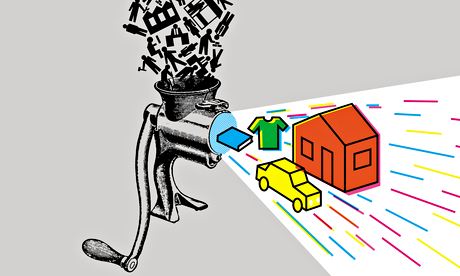
It isn't all that often that your heart bleeds for an estate agent. When I read that the Poundland boss, Steve Smith, has shacked up with the founder of the dating website Match.com to launch something called Estatesdirect.com, mine did. It would, said one newspaper, give homeowners a "warm glow". Sell your home for £390 plus VAT! Save yourself a bunch of hassle and cash! That'll show the bastards who keep messing you around.
In the brave new digital world, we're all experts. We can sell our homes online, or rent them out on the travel accommodation site Airbnb. We can post our own music, publish our own books, and edit our own magazines. We can, in other words, cut out the middle man. And this is just the start. It won't be long before we can print our own stuff on 3D printers and share energy on a global network called "the internet of things". Never mind Ed Miliband and his "cost of living crisis". It's algorithms that will cut our costs and set us free.
Quite a few people will be excited by the thought of a world where so many things are so cheap. The people, for instance, who spent a lot of time camping outside St Paul's seemed to think capitalism was a bad thing (but that other people paying to clear up after them was probably OK).
Quite a few social theorists seem to think so, too. One of them, a man called Jeremy Rifkin, who's taken very seriously as a guru on the future, seems to think capitalism is "giving way to a new economic paradigm". In his book The Zero Marginal Cost Society, which created quite a stir this week, he says it will be pushed to the margins by a "collaborative commons", where the cost of goods and services will be cut to nearly zero. There is, he says, an "unmistakable feeling of possibility in the air".
There might indeed be a feeling of "unmistakable possibility" when you're the author of 19 bestsellers and can charge $40,000 for a talk you've given before. If this was the sort of money you could get by talking about collaboration, you might think that the death of capitalism was working out rather well.
But if you were one of the people whose "goods and services" were now worth pretty much nothing, you might not. If, for instance, you were a musician who used to make quite a good living, and now doesn't, you might think that the word "sharing" doesn't sound half as nice as it did before. And if you were a journalist who found that you were now expected to write for "a nominal fee", you might wonder how your landlord would feel about a "nominal" rent.
You're an academic and you think you're safe? Moocs – online courses offered for almost nothing – are hovering like birds about to seize their prey. Legal writer? Those algorithms are out to get you. Financial adviser? Toast. That, at least, is the prediction of two economists in a 2013 Oxford Martin report called The Future of Employment. Some 47% of US jobs, they say, are at risk from computerisation. And what happens there will happen here.
No wonder so many people are setting up on their own. Since 2008, according to figures from the Office for National Statistics, about 333,000 people have registered as self-employed. By 2018, according to a report by the RSA, there will be more people self-employed than in the public sector. This, it says, is because lots of people "dislike hierarchy" and want to be "masters of their own fate". Or perhaps they've been made redundant and can't get jobs as good as the ones they had before.
There's an earthquake about to hit us. It won't be today, but it's on its way. The working classes have been here already. They've watched whole industries shipped out to China and wiped out. They've seen the service-industry work that's left go to immigrants who think they've won the lottery with the minimum wage. Now it's time for the middle classes. Savour your Sauvignon while you can.
You wouldn't, of course, know any of this from our politicians. The Tories talk about "full employment" as if, in the new digitised world, that's a simple step. They seem to think that all you have to do to build a nation of "entrepreneurs" is to cut "red tape". Labour seems to think that the best way to address the "cost of living" crisis is to preserve terms and conditions in the public sector that would make most workers weep for joy. It seems to forget that 80% of workers are in the private sector, and that quite a few don't actually report to a boss.
And both left and right seem to think education is something that should be geared towards a world that looks pretty much like the one we're in now. An Ofsted report this week said nurseries weren't good at preparing children for school. On the evidence they're not, but the much bigger problem is the schools. In the Pisa international education league tables, Britain is currently 23rd in reading and 26th for maths. If our children can't even read or count, God only knows how they're going to survive in a world where they have to live on their wits.
Steve Smith, by the way, sold Poundland for £50m. He made his fortune, and good for him. In the digital, low-cost "collaborative" new world, most "entrepreneurs" won't.

